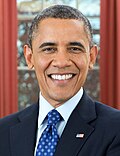Ron Kirk | |
|---|---|
 Official portrait, 2009 | |
| 16th United States Trade Representative | |
| In office March 18, 2009 –March 15, 2013 | |
| President | Barack Obama |
| Deputy | Demetrios Marantis |
| Preceded by | Susan Schwab |
| Succeeded by | Michael Froman |
| 56th Mayor of Dallas | |
| In office June 5,1995 –February 20,2002 | |
| Preceded by | Steve Bartlett |
| Succeeded by | Laura Miller |
| 97th Secretary of State of Texas | |
| In office April 4,1994 –January 17,1995 | |
| Governor | Ann Richards |
| Preceded by | John Hannah |
| Succeeded by | Tony Garza |
| Personal details | |
| Born | Ronald Kirk June 27,1954 Austin,Texas,U.S. |
| Party | Democratic |
| Spouse | Matrice Ellis |
| Children | 2 daughters |
| Education | Austin College (BA) University of Texas at Austin (JD) |
Ronald Kirk (born June 27,1954) is an American lawyer and politician who served as the United States Trade Representative from 2009 to 2013,as the 97th secretary of state of Texas,and as the 56th mayor of Dallas from 1995 to 2002. He is a member of the Democratic Party.
Contents
- Early life and career
- Texas political career
- Post-mayoral career
- U.S. Trade Representative
- Nomination
- Work as U.S. Trade Representative
- See also
- References
- External links
Born in Austin,Texas,Kirk is a graduate of Austin's John H. Reagan High School,Austin College,and the University of Texas School of Law. From 1994 to 1995,Kirk worked as the secretary of state of Texas,until he was elected as the mayor of Dallas,where he served from 1995 to 2002 and was the first African-American to hold either of those positions. He ran for the United States Senate in 2002,but was defeated by Republican opponent John Cornyn. After his defeat,Kirk worked as a partner at the Houston-based law firm Vinson &Elkins and worked as a lobbyist for Energy Future Holdings and Merrill Lynch. [1] [2]
Kirk was nominated by President Barack Obama to serve as U.S. Trade Representative and on March 18,2009,and was confirmed by the U.S. Senate in a 92–5 confirmation vote. [3] On January 22,2013,Kirk announced that he would be stepping down as U.S. Trade Representative [4] [5]





